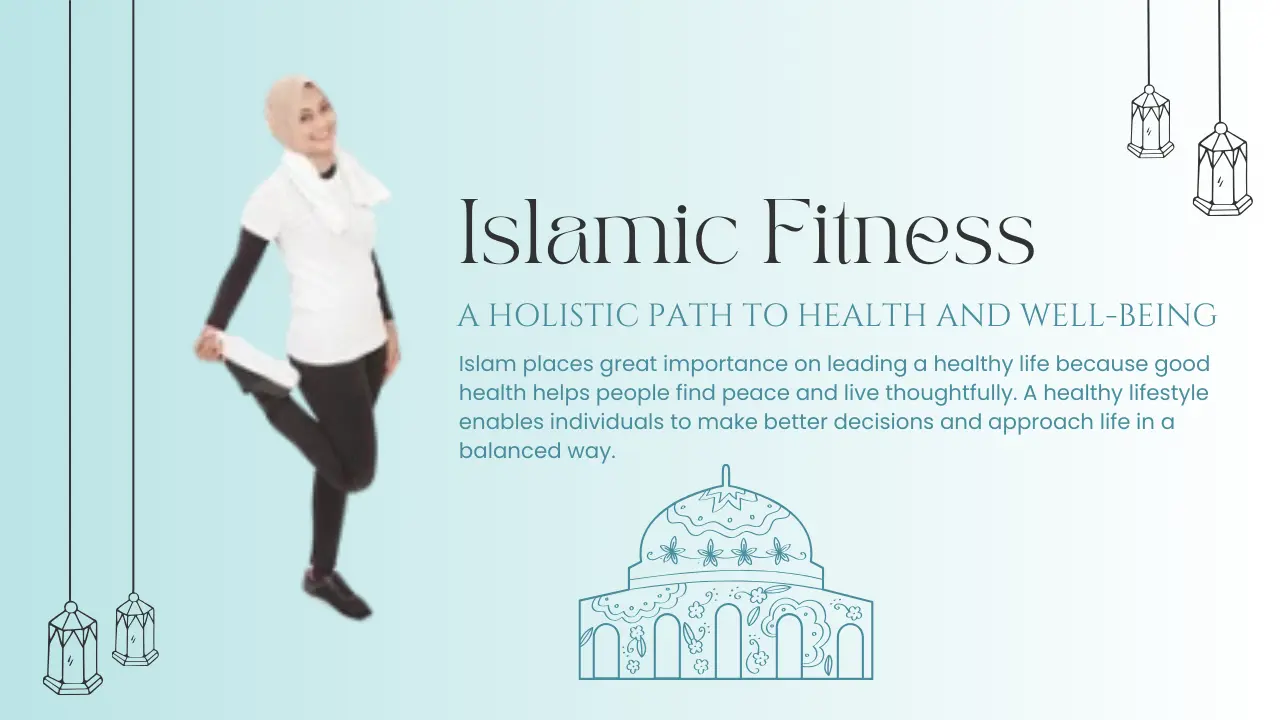
A Holistic Path to Health and Well-Being
Islamic Fitness: Islam places great importance on leading a healthy life because good health helps people find peace and live thoughtfully. A healthy lifestyle enables individuals to make better decisions and approach life in a balanced way.
Islam also encourages the use of our intellect in every aspect of life, and a sound mind and body are essential for clear thinking. Emotional and physical fitness are key to living a fulfilling life.
Allah says in Surah Al-Araf, verse 31
“O Children of Adam! Dress properly whenever you are at worship. Eat and drink, but do not waste. Surely He does not like the wasteful” (Surah Al-Araf, 7:31)
This verse highlights the balance that Islam promotes in eating, drinking, and living without excess.
Table of Contents
The Importance of Health in Islam
Our beloved Prophet Muhammad (peace be upon him) said:
“The strong believer is better and more beloved to Allah than the weak believer, while there is good in both.” (Muslim)
This hadith emphasizes the importance of having strong faith and good character. However, it also highlights the need to maintain good health and fitness. Islam encourages Muslims to take care of their spiritual, physical, and emotional well-being, as all these aspects are interconnected and contribute to living a balanced and fulfilling life.
The Role of Physical Activity in Islamic Teachings
1. Fitness in the Sunnah
The life of the Prophet Muhammad (peace be upon him) provides numerous examples of physical activities that contribute to overall fitness:
- Walking: The Prophet was known for his brisk walking, a simple yet effective exercise backed by science. Studies reveal that brisk walking reduces the risk of cardiovascular disease by 31% and diabetes by 40%.
- Archery and Swimming: He encouraged skills like archery and swimming, promoting strength, coordination, and endurance.
2. Maintaining Physical Strength
Islam encourages believers to maintain physical strength. A hadith states:
“A strong believer is better and more beloved to Allah than a weak believer, while there is good in both.” (Muslim)
Strength, in this context, goes beyond muscles—it includes resilience, energy, and the capacity to serve others effectively.
A Balanced Diet: The Prophetic Model
1. Eating in Moderation
The Quran advises against overindulgence:
“…Eat and drink but waste not by excess…” (Quran 7:31)
This is echoed in modern health guidelines, which advocate for mindful eating and portion control to combat obesity and its related illnesses.
2. Healthy Food Choices
Prophetic traditions highlight foods rich in nutrients:
- Dates: A staple in Islamic tradition, dates are a powerhouse of energy, fiber, and essential minerals.
- Honey: Known as a remedy in the Quran (16:69), honey boasts antibacterial and antioxidant properties.
- Olive Oil: Frequently mentioned in Islamic texts, olive oil is celebrated for its heart-health benefits.
3. Fasting for Detox and Discipline
The practice of fasting during Ramadan demonstrates Islam’s integrated approach to health. Beyond spiritual rewards, intermittent fasting—a similar modern health trend—has been linked to weight loss, improved insulin sensitivity, and cellular repair.
Mental and Emotional Well-Being in Islam
1. Prayer as Stress Relief
Salah (prayer) offers more than spiritual benefits; it acts as a stress reliever. According to a study published in Psychological Reports, regular prayer improves mental clarity and reduces anxiety. The physical movements in Salah, such as prostration, also enhance blood circulation and posture.
2. The Power of Gratitude and Positivity
Islam encourages gratitude as a pathway to happiness and mental peace:
“If you are grateful, I will surely increase you [in favor]…” (Quran 14:7)
Studies in positive psychology align with this, showing that practising gratitude boosts mood and resilience.
Scientific Validation of Islamic Practices
Modern science often validates practices emphasized in Islam centuries ago:
- Fasting: Studies from journals like Nature confirm that fasting promotes autophagy, a process where cells clean out damaged components, reducing the risk of chronic diseases.
- Walking: Research from Harvard Medical School highlights walking as one of the easiest ways to boost overall health, mirroring the Prophetic practice.
- Meditative Practices: Islamic dhikr (remembrance of Allah) mirrors mindfulness techniques proven to lower stress and improve focus.
Actionable Steps for Incorporating Islamic Fitness into Daily Life
Start Your Day with Fajr: Begin your day with morning prayers and a light workout to energize your body and soul.
- Eat Prophetic Superfoods: Incorporate dates, honey, and olive oil into your diet.
- Walk Regularly: Follow the Sunnah by making walking a part of your routine.
- Practice Gratitude: Keep a gratitude journal to nurture positivity.
- Fast occasionally: Adopt intermittent fasting for both spiritual and physical benefits.
Conclusion
Islamic fitness is more than a set of guidelines; it’s a comprehensive way of life that nurtures the mind, body, and spirit. By integrating these timeless principles, individuals can achieve a state of holistic well-being, staying aligned with both faith and modern health trends.
So, why wait? Embrace Islamic fitness today and embark on a journey to a healthier, happier life!
Related Article Links
- [ https://medium.com/@howtomuslimnow/the-holistic-approach-of-islam-to-health-and-lifestyle-6c802e72f4b6 ]
- [ https://www.facebook.com/story.php/?story_fbid=122166106088110917&id=61553327513979&_rdr ]
- [ https://healthtolife.in/category/health-islam/ ]
FAQs
Ques-1: Is exercise necessary in Islam?
Ans: Yes, Islam encourages physical activity as part of maintaining good health and fulfilling one’s duties effectively.
Ques-2: Can fasting help in weight loss?
Ans: Fasting, especially intermittent fasting, can aid in weight management, improve metabolism, and provide other health benefits.
Ques-3: What are some Sunnah exercises?
Ans: Walking, swimming, archery, and horse riding are activities endorsed by the Prophet Muhammad (peace be upon him).
Related Video
Was this article helpful?
Stay updated with the latest posts on HealthToLife—expert health tips, wellness trends, and life-changing advice you don’t want to miss. Click to explore.



